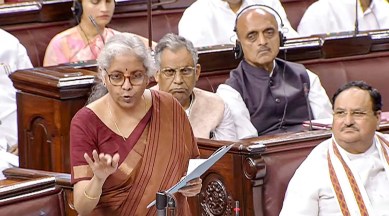Stay updated with the latest - Click here to follow us on Instagram
Tax, prices of many essentials were higher before GST: Nirmala Sitharaman
“Many Opposition members said that due to imported inflation and because of the imported supply chain-related problems and global commodity prices, we are being impacted. These are realities and we are here to discuss. Nobody is in denial about price-rise,” Nirmala Sitharaman said.

Union Finance Minister Nirmala Sitharaman on Tuesday said prices of many essential items were higher before the introduction of Goods and Services Tax (GST) under the Narendra Modi government, which is “not in denial about price-rise”.
But compared to the years under the Congress-led UPA’s second term, prices of perishable commodities such as vegetables are lower due to joint efforts of the government and the Reserve Bank of India, Sitharaman said while replying to a discussion on price-rise in Rajya Sabha.
“Many Opposition members said that due to imported inflation and because of the imported supply chain-related problems and global commodity prices, we are being impacted. These are realities and we are here to discuss. Nobody is in denial about price-rise,” she said.
“We have made sure that the RBI and the government together are taking enough steps to make sure that it (inflation) is kept at 7% or below, ideally below 6%. Therefore, when we say look at the world, where some countries are experiencing inflation which they have not experienced in 40 years, it does not mean we are saying there is no inflation in this country,” Sitharaman said.
Reiterating that the changes in GST approved at its 47th council meeting were not opposed by any Opposition-governed state, Sitharaman said the tax regime has not increased burden on families “because the rates on some items before GST were much higher”.
Sitharaman listed pre- and post-GST tax rates on several items to buttress her point: hair oil, she said, had 29.3% tax before GST was introduce, and 18% GST now. Similarly, she listed toothpaste (29.3% pre-GST to 18% GST now); soap (29.3% to 18%); footwear priced over Rs 1,000 (21% to 18%); paints (31.3% to 18%); sugar (6% to 5%); sweets (7% to 5%); washing machine (31.3% to 18%); vacuum cleaner (31.3% to 18%); TV sets up to 32 inches (31.3% to 18%); LED lamps (15% to 12%); kerosene pressure lanterns (8% to 5%).
“Families which want to buy things today are buying them at a far lesser rate under GST,” Sitharaman said, responding to a point raised by Trinamool Congress MP Derek O’Brien.
She also credited the government with keeping the macroeconomic fundamentals strong.
On Monday, responding to the debate in Lok Sabha, Sitharaman had quoted former RBI Governor Raghuram Rajan to say that the central bank has performed well in increasing the country’s foreign exchange reserves and insulating it from problems being faced by the likes of Pakistan and Sri Lanka.
On Tuesday, responding to taunts from the Opposition, she underlined: “I have taken everything from former (RBI) Governor Rajan which he said as an economist. Suppose he has given a political opinion, no, I have not taken from it.”
Sitharaman said that under UPA-2, the average price of various food commodities per kg such as tomato, onion and potato had touched triple digits. But the focus on these three items under the TOP aspect of the Operation Greens scheme, launched in November 2018, has helped the Centre keep their prices tied at “reasonable levels”.
“In November 2013, the price of onion had touched Rs 100 per kg in certain centres; tomato was Rs 80 per kilo,” Sitharaman said. “It does not matter whether I am an onion eater or not. Not just me, the PM also has a concern…. On May 1, 2009, potato was Rs 9 per kilo, and in November 2013, it was Rs 26. And now, in July, it is Rs 26. We have contained the prices.
“The per kilo price of onion rose from Rs 52 in 2009 to Rs 98 in 2013. Tomato was selling at Rs 46 per kilo in 2013 and Rs 34 today.”
Sitharaman rejected charges that the Centre is withholding amounts earned through various cesses instead of sharing them with states. She also claimed that the total flow of funds to states have increased substantially under GST, as has the average resource growth.
“Between 2013-14 and 2023 (Budget Estimate), Rs 3.77 lakh crore cess has been collected (as cess). Rs 3.93 lakh crore has been utilised by states. It goes to the states promptly,” she said, also going on to draw comparisons on total development expenditure incurred by the Modi government and UPA-I and UPA-2.
“RBI data shows the total development expenditure incurred by Modi government, between 2014 and 2022, was Rs 90.9 lakh crore, far higher than what is being spoken about. In contrast, only Rs 42.9 lakh crore was spent between 2004 and 2014,” she said.